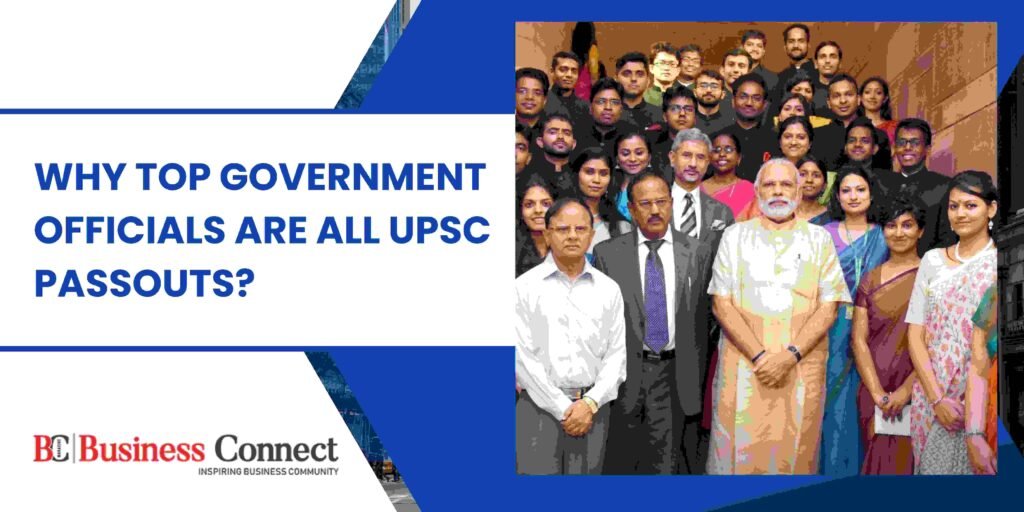Why Top Government Officials are all UPSC Passouts?
Ajit Doval, S. Jaishankar, Ashwini Vaishnav, & Hardeep Puri, all leading government figures, have something in common – they were once UPSC aspirants. But what sets these ministers apart? In India, many cabinet ministers previously served as civil servants. The question arises: why does the government seem to prefer civil servants for such significant roles?
The answer lies in the unique skills assessed through the UPSC civil services exam, taken annually by around 10 lakh candidates. From this pool, only about 700 to 800 candidates become civil servants, like IAS & IPS officers.

what are these unique skills that make these civil servants stand out?
So, what are these unique skills that make these civil servants stand out? Let’s delve into some details. Firstly, patience and persistence play a crucial role as the exam preparation alone takes about 2 years, sometimes with multiple attempts over 4-5 years. Technical knowledge covering diverse subjects like history, polity, science, etc., is another key aspect.
Moreover, interpersonal skills such as empathy, social abilities, and the capability to handle constructive feedback are highly valued. Additionally, the ability to lead a team effectively is essential. These attributes are rigorously tested through the UPSC exams, which is why those who clear it possess such a diverse skill set.
Following selection, candidates undergo training, after which they are appointed to various roles, such as District Magistrate (DM) or Deputy Superintendent of Police (DySP). With 20-30 years of experience, they may ascend to positions like Secretary to the Government of India.
While these services offer perks and positions of power, they also require dedication and consistent service. After retirement, officers often contribute to the government in advisory roles due to their extensive experience.
Individuals like Ajit Doval, Sardar Patel, and others have hailed civil servants as the backbone of India’s administrative system, emphasizing their crucial role in shaping the nation’s future.
In essence, the government values the skills honed through the UPSC exam, making these civil servants the backbone of India’s governance.”
5 skills with the help of which you can clear the UPSC exam.

1. Patience and Persistence: This skill is vital due to the extensive preparation required for the UPSC exam, often spanning two years or more, with candidates facing multiple attempts before succeeding.
2. Technical Knowledge: Aspirants need comprehensive knowledge across various subjects like history, polity, science, international relations, and environmental studies, ensuring a well-rounded understanding of diverse topics.
3. Interpersonal Skills: Empathy, social skills, and the ability to handle constructive feedback are essential. Civil servants often navigate complex social structures and need to effectively engage with diverse groups.
4. Leadership Abilities: The capacity to lead and manage teams efficiently is crucial. Candidates must display traits of a good team leader, which they further develop during their probation period and subsequent service.
5. Problem-Solving and Decision-Making: The ability to analyze situations, devise solutions, and make informed decisions is paramount. Civil servants encounter multifaceted challenges requiring practical and strategic solutions.
Q: Why are many top government officials often UPSC passouts?
Many top government officials were once successful candidates of the UPSC (Union Public Service Commission) examination, which is the pathway to becoming civil servants in India. The UPSC exam rigorously tests various skills and competencies required for administrative roles in the government, hence many successful candidates from this exam often end up in significant positions within the government.
Q: What skills and qualities do UPSC pass-outs possess that make them suitable for top government roles?
UPSC pass-outs exhibit a diverse skill set including patience, extensive technical knowledge across various subjects, strong interpersonal skills, effective leadership abilities, and adept problem-solving capabilities. These skills are crucial for handling the complex and multifaceted challenges faced in government roles.
Q: Are there any specific advantages to having UPSC pass-outs in top government positions?
Yes, individuals who have successfully cleared the UPSC exam bring a comprehensive understanding of governance, having undergone extensive training and testing. Their experience, acquired through years of service, equips them to navigate bureaucratic systems efficiently, understand ground-level problems, and contribute meaningfully to policy-making and administration.
Q: How does the UPSC selection process ensure the suitability of candidates for government roles?
The UPSC exam assesses candidates through various stages, testing their knowledge, aptitude, and personality traits. By selecting candidates who clear this rigorous examination, the UPSC ensures that those entering government service possess a well-rounded skill set necessary for handling diverse roles and responsibilities.
Q: Is there a preference for civil servants in high-ranking government positions?
While it’s not mandatory, there is often a tendency within the government to favor individuals with a civil service background for key positions. This preference is due to the extensive training, experience, and diverse skill set that UPSC passouts bring to the table, making them well-suited for top administrative roles.
Must Read:
- Top 10 Finest Guest Posting Sites in Modern India
- Guest Blogging: Unlocking Opportunities and Amplifying Your Online Presence
- Guest Blogging Advantage: Transform Your Digital Strategy with These 10 Powerful Benefits
- Unlocking the Secret Benefits of Guest Blogging: 10 Hidden Gems to Unleash Success!
- Use Guest Blogging to Its Full Potential: 10 Key Advantages You must Know
- Google Blogger Mastery: Unlock Your Blogging Potential Today
- 5 Top Link Building Tactics For 2023
- Top 10 Finest Guest Posting Sites in Modern India



